EATING THE AEGEAN
Big bangs, crazy love and rusk taking
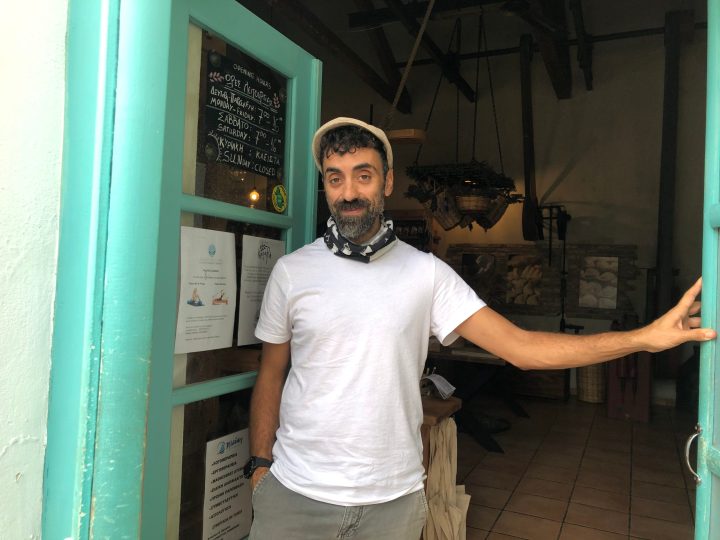
Kythira, the island of Aphrodite, the Goddess of Love, olive trees and not a few Australians, is just the place to start a love affair with a crispy and not-too-hard carb.
Pavlos Koronaios, from the Karavas Bakery on the Greek island of Kythira, didn’t actually say this: I’m quoting from Nikos Kazantzakis’ Zorba the Greek:
“Tell me what you do with the food you eat, and I’ll tell you who you are. Some turn their food into fat and manure, some into work and good humour, and others, I’m told, into God.”
But Pavlos could have said that.
Because here on the picturesque patio of his bright and buzzy bakery, using Mediterranean hand gestures to press a point, Pavlos Koronaios leaps enthusiastically down conversational roads less travelled. This includes the sensuality of smelling nothing at all, generational obligations, holy trees and the humble rusk as a means towards embracing existentialism.
He’s also raising this modest rusk from its zero position on my Food O’ Meter into an heroic, and what’s more, desirable super food (I have only succumbed to the occasional Ouma rusk).
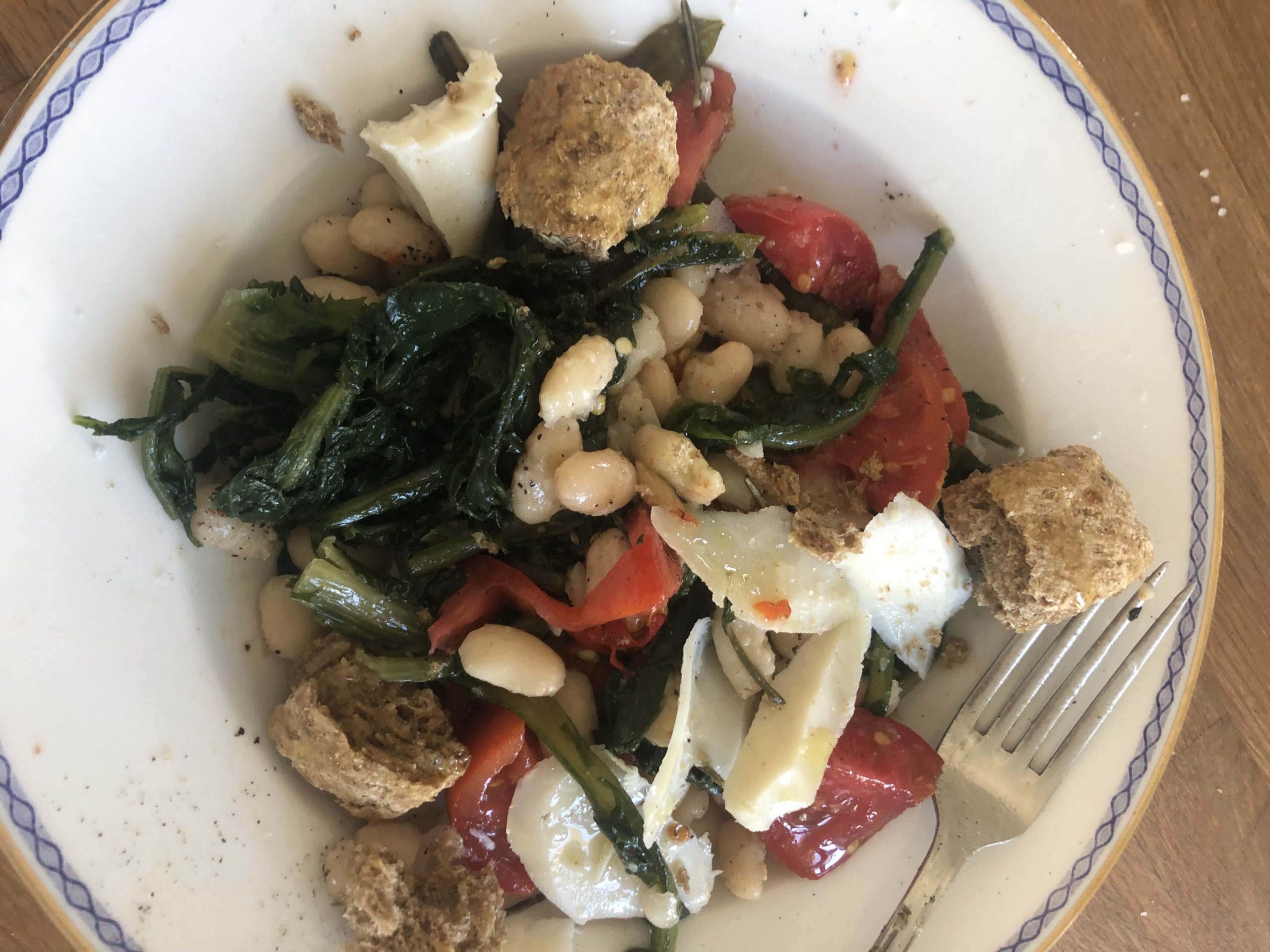
Toss them into Greek salads. (Photo: Michele Botha Karamanof)
But Karavas Bakery under a melting European sun feels a far cry from the sub-zero temperatures of Molteno in the Eastern Cape where Ouma Greyvensteyn baked her first rusk (hers too are double-baked) in 1939. While “Dip ’n Ouma” is steeped in popular South African rusk culture and comedian Barry Hilton says to qualify as a South African, you need to know “the exact time to take that rusk out the coffee”, the first known rusk was made by Paxamos, a Byzantine baker in Greece in 1st Century AD – mainly for soldiers and sailors who appreciated its long shelf life.
“Just 20 years ago,” says Pavlos, “if you asked Greeks, ‘what are rusks for you?’, they would answer the Cretan rusk. It’s made out of barley flour and it’s basically a big hard brick so you have to dip it into something liquid or eat it with tomato or cheese. Sure, it’s a main dish – by eating one, you’re full – but our rusks are cut smaller and combine new tastes and ingredients. They’re also edible without you having to add anything. You can eat one without losing any body part, like a tooth.”
But back a step.
I’m still in Kythira. I’m still eating the Aegean.
“Go meet Pavlos in Karavas village,” says a new friend. “He’s known as the funky baker because he’s a DJ who spins discs as well. He’s got a fab house in the middle of nowhere. He’s about early 40s and makes what he calls ‘world famous’ rusks that are exported.”
“I don’t really eat rusks.”
“You soon will.”

Inside the Karavas Bakery with the old olive oil factory equipment still standing. (Photo: Supplied)
Back at the patio. Actually, says Pavlos, there is a distinct similarity with trying your first Karavas Bakery rusk and the start of a love affair. (Since Pavlos, eligible and charming, has escaped the net of marriage and the “clutches of a few potential mother in laws” on a small island, he is more than qualified to expound on this subject.)
“In the beginning comes a ‘feeling’. You want to approach this rusk. But how to do this? How to do this? You circle the rusk a bit. Look, you say to yourself, it has a beautiful colour, it has this organic shape, and these things that in the rusk morphology are small holes.”
At this, Pavlos’ very tanned finger has trailed the vein sticking out of my hand all the better to illustrate the similarities between the holes in his “‘world famous” rusks and the “body’s morphology”.
‘‘The next step is to put this rusk to your mouth, all the while thinking, ‘Am I doing the right thing?’ Because it looks like it could be hard and hurt you. Yes, of course,” he says, “we are still talking about personal relationships too. It’s the same.”
But when you do bite it, “hey, there’s a surprise”. “It’s so crispy and so not hard you can almost eat it without teeth”’
And then?
“Ah, after comes the sound, this great crunch, this Big Bang exploding in your head. Of course, you also want to smell it, but at first there’s no smell. But this means only a greater surprise, an anticipation, a journey into the unknown. How is this thing eventually gonna smell, you ask yourself? You want to say to this rusk. ‘Come on. Give me something’.”
His personal favourite is the one with the original traditional olive oil flavour. “I grew up on these. I remember dipping them into my milk. For me the smell and the taste of the rusk reminds me of my whole existence.”
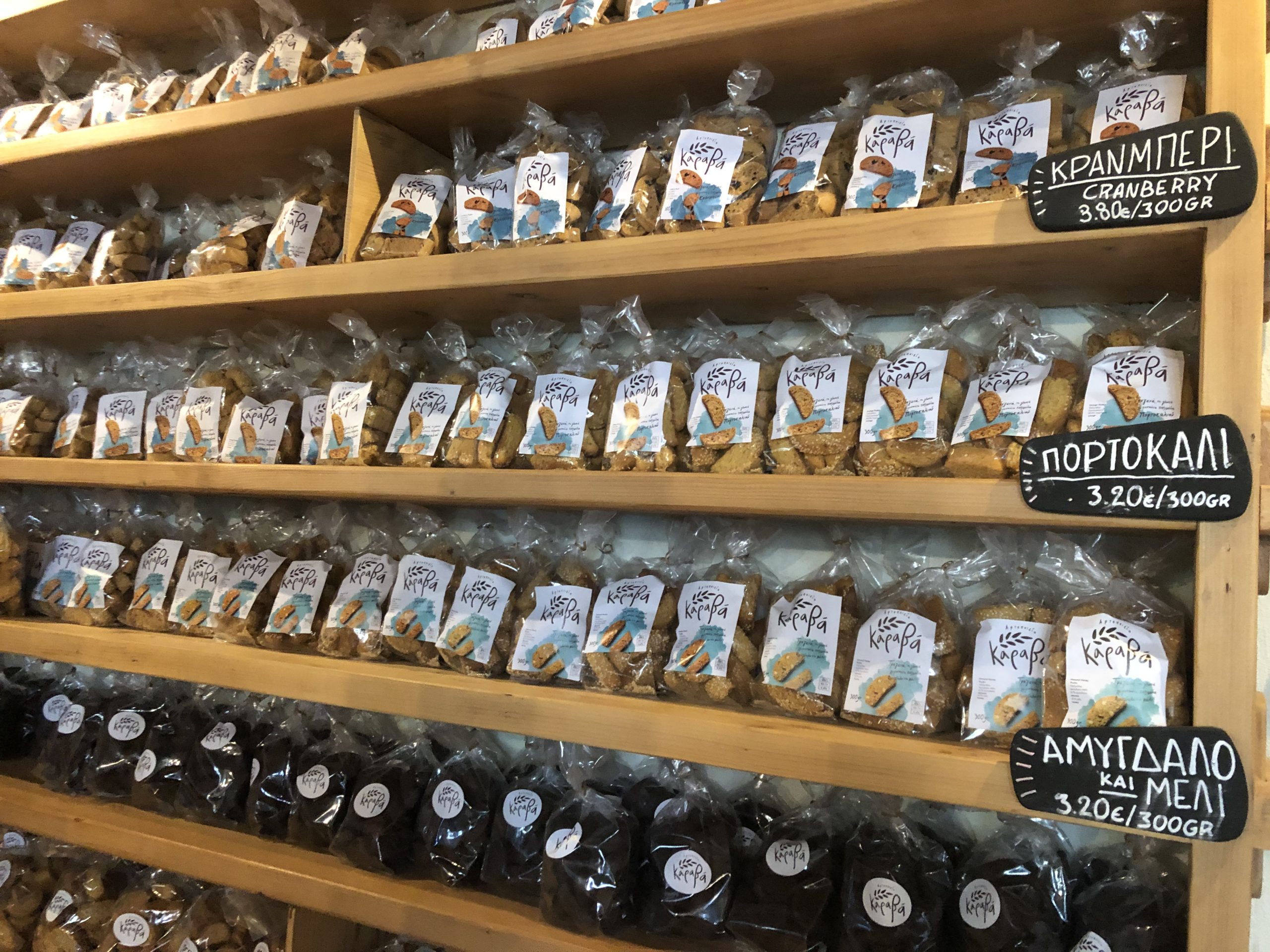
Rusks of many flavours. (Photo: Michele Botha Karamanof)
All the varieties – there are many including the olive and oregano rusk, the almond and honey rusk, the spicy rusk, the anise rusk for starters, and on the cards is the gluten-free rusk – are made with local Kytherian olive oil.
“No matter what lifestyle you’ve living, whether you were born in the big city and live among concrete, the taste of olive oil will touch a special nerve. It hits you. This bite is enough to wake up something dormant: and that’s being in touch with our connection to the earth.”
It’s like stepping on the ground barefoot after the first rainfalls, he says. “It takes us to a primitive place. You realise it was always like this. And always will be. The same smell, the same feeling, the same magic.’
“For us Mediterraneans, the olive trees equal holy trees. They live forever. They give, give, give, whether you take care of them or not.’
Pavlos’ grandfather Dimitris is the first generational link in this story. “As with all pioneers my grandfather was seen as the ‘crazy lunatic of the village’. He went to Australia in the early 1900s, worked in factories, including in agricultural olive oil production, but around the age of 30, still in love with Kythira, came home.
“He was going completely against the social wave back then. Most Kytherians were trying to find a way to go to Australia, but my grandfather did completely the opposite.
“If all of Kythira was facing Australia, there was a single man standing alone in Australia, facing Kythira.
“Greeks are romantic by default,” shrugs Pavlos. “So in his 30s he moved back full of experience and full of money, and started the olive oil press in 1932.” It closed when Greeks left Kythira as part of another immigration boom in the 60s. And reopened again in 2006 thanks to Giannis, Pavlos’ dad, who had moved to Kythira in 1990 from Athens.
“He had a dream of turning his father’s abandoned olive mill into a bakery and it became the dream of the whole family. And yes, it was in Karavas before it was discovered by tourists. In those days, people only came here if they worked here or by bad luck if they’d lost their way.
“Everyone thought we were crazy. But this craziness, and a belief that things will work out, is in the veins of our family.”
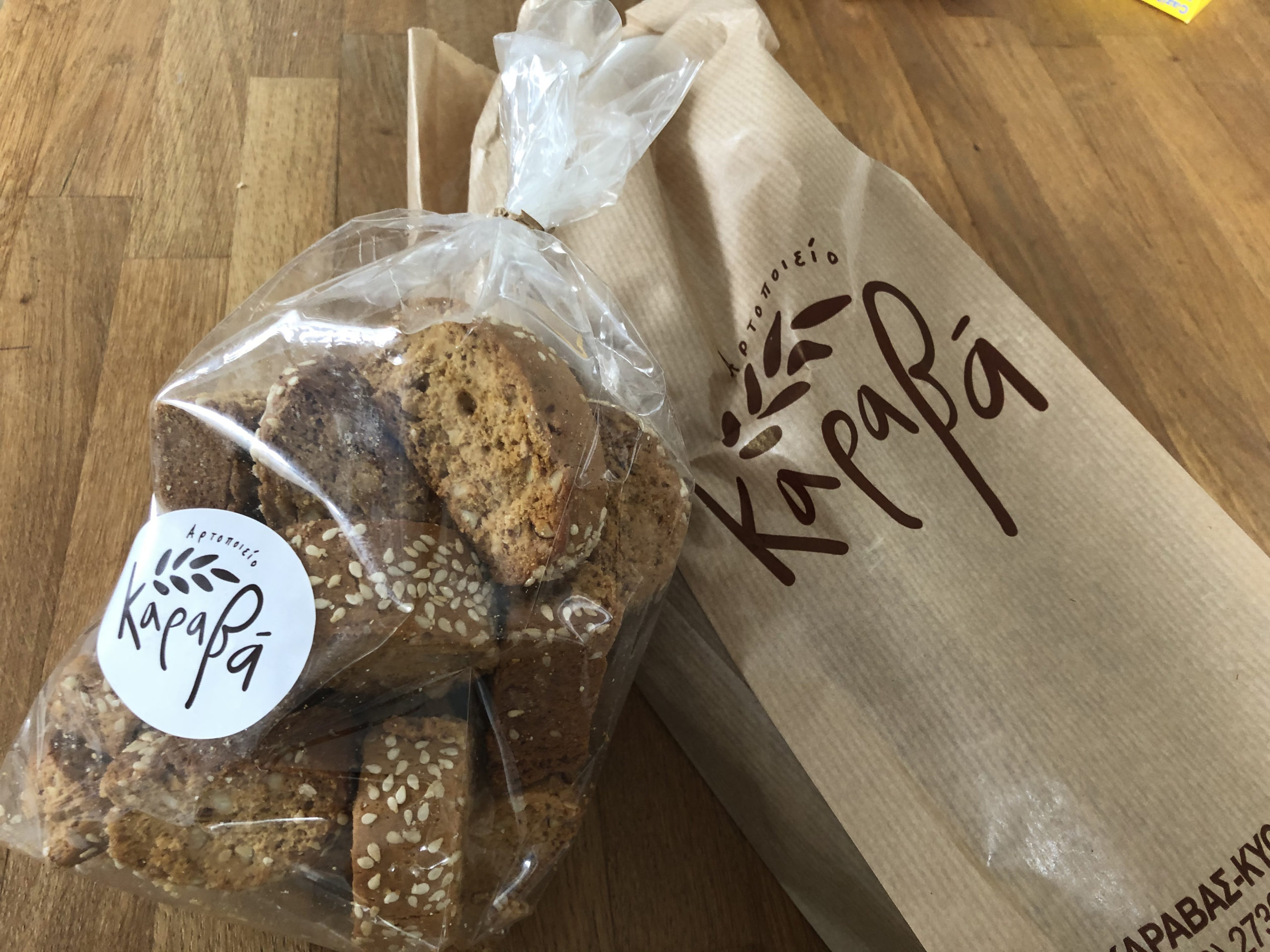
Rusk is ready for its close-up. (Photo: Michele Botha Karamanof)
But back to crazy love and rusks.
“The smell of this rusk is so subtle you have to put it into your mouth again to get the full experience! But new surprises are coming. You realise you can’t really eat only one. And then you work out, ‘Fuck, I can combine this with so many things: dipping it into Nutella, or with tomato, cheese or olives or break it into salads…’ ”
“Rusks evoke memories further back than my existence. They connect me to the years of my grandfathers before I was alive and they connect me with the future of my unborn children.
“If I stretch my hand on one side, I receive the knowledge of the previous generation and improve on it so that with my other hand I can give it to the next generation. And I am the only one who can make this connection because if I break it, I break the chain between the past and the future.”
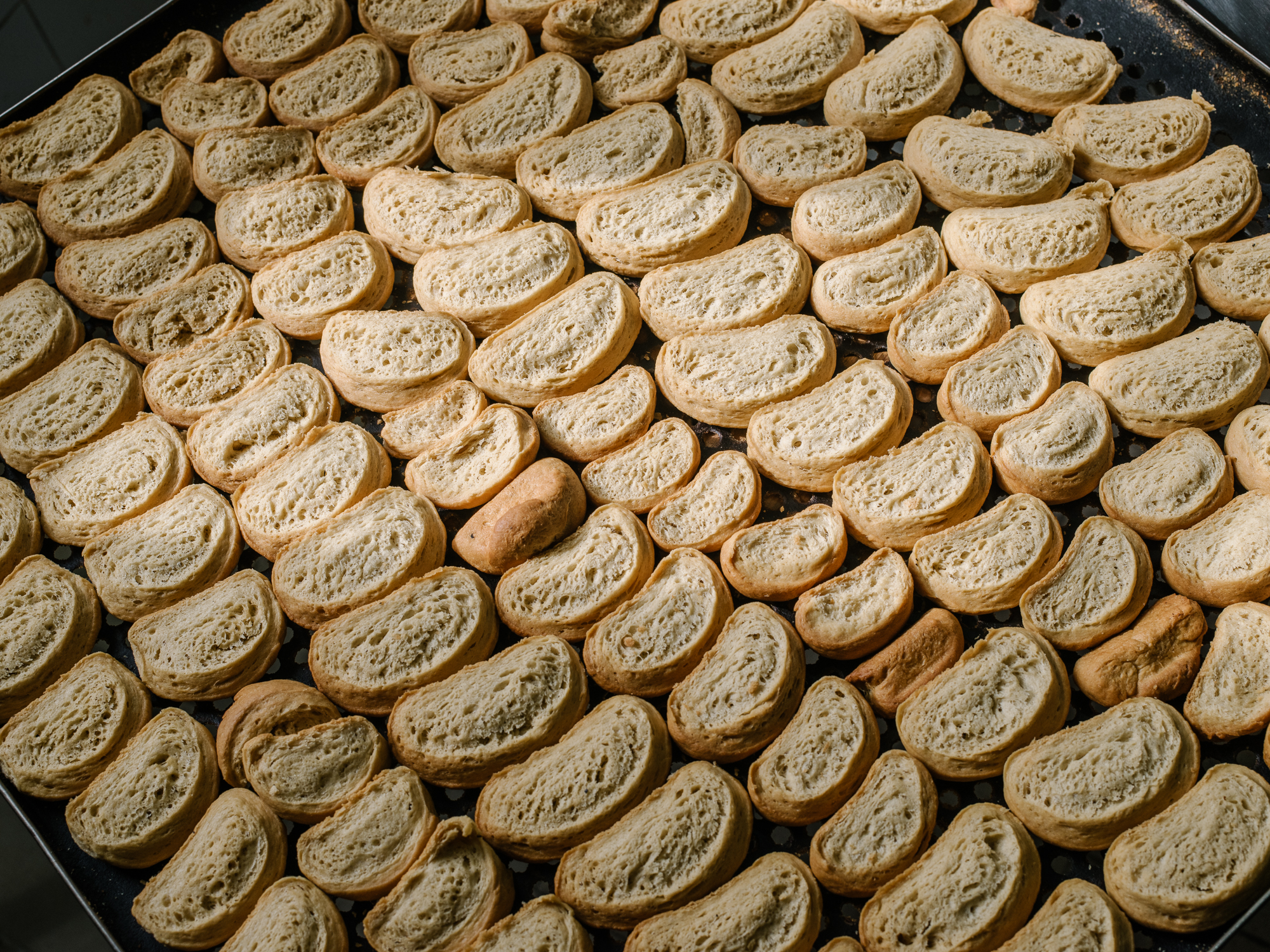
Half-baked rusks at Karavas Bakery. (Photo: Supplied)
There is one ingredient essential in all this. Everyone needs it. It’s called “trela” in Greek. “It’s a craziness, a type of madness you need to have in order for you to take a risk.”
It’s Zorba all over again speaking to his English boss: “You’ve got everything, except one thing: madness. A man needs a little madness, or else…”
“Or else?”
“He never dares to cut the rope and be free.”
Pavlos feels free all right. “Living in a healthy place with clean air, aware of what you’re eating, it helps you to live better. Time seems to go slower here.
“We’ve never regretted doing this. We’ve recently opened a shop in the capital, Chora, in the south of the island. We have a daily production of almost one and half tons of rusks and export round Greece, and into some European countries, like Switzerland, Germany and to Singapore and England.”
Zorba would have a field day with this all – including with the bakery’s logo: A life worth tasting. “If only I was as young as you! I’d throw myself headlong into everything. Headlong into work, wine, love – everything, and I’d fear neither God nor Devil.”
I think it’s called taking a rusk. DM/TGIFood
Read Aphrodite and I, lemon lipped in Kythira, Nia’s first Eating the Aegean column.
The writer supports the Gift of the Givers Foundation which provides non-governmental disaster relief in South Africa. You can support them here.



 Become an Insider
Become an Insider
Anthansia Ntaimont trelathike yia ta paximathia
but then she does have “trela” so it figures…….